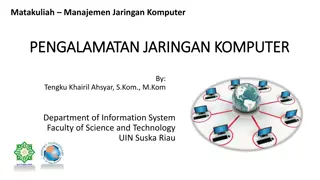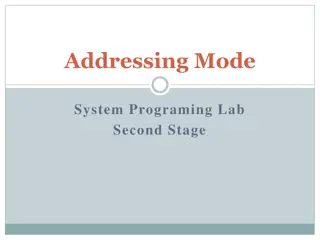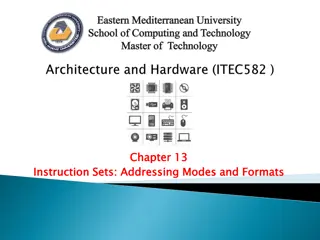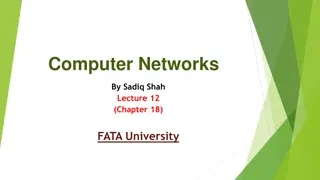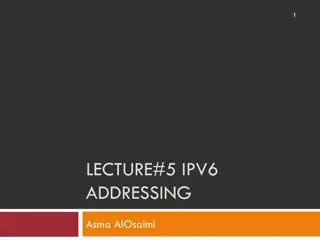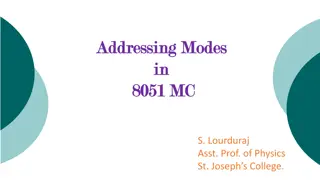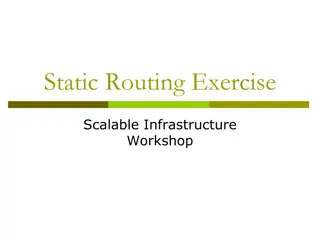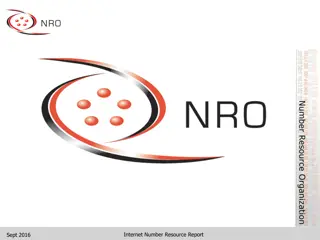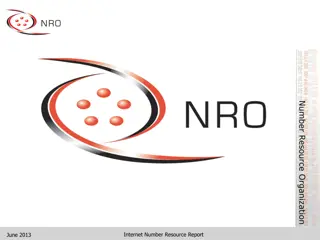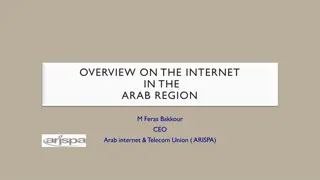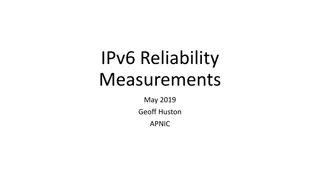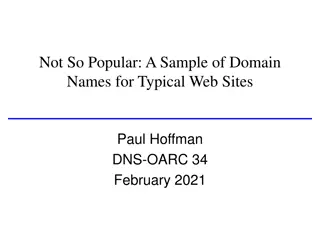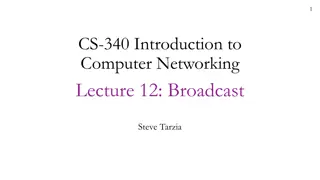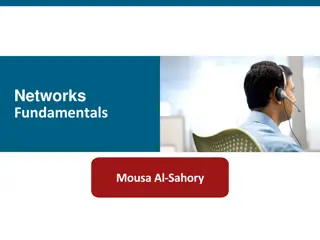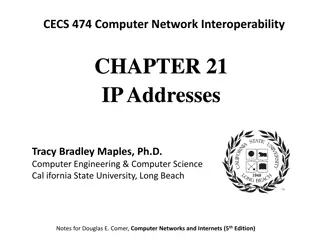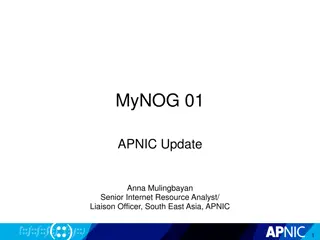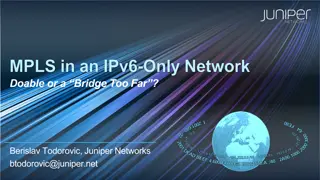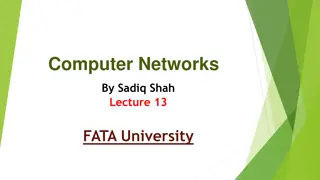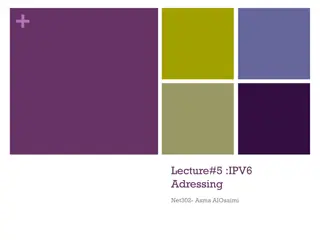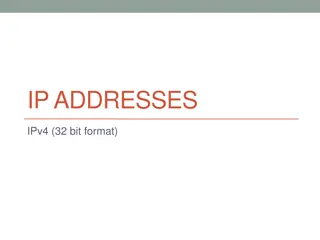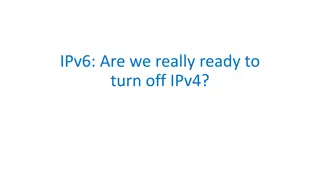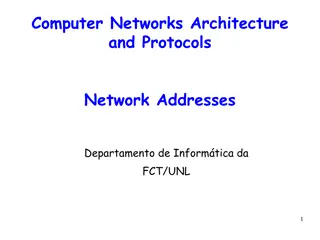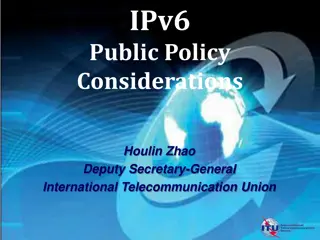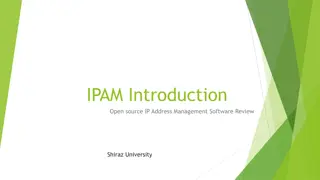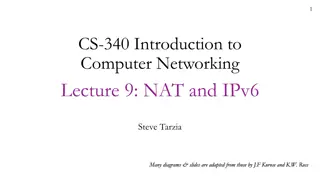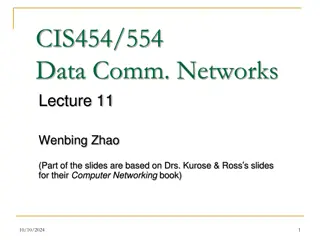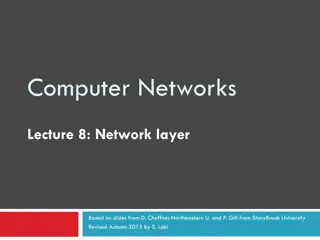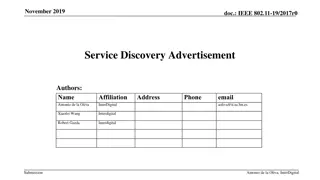Understanding Computer Network Addressing
Every computer connected to a network has a unique logical address for communication, typically identified using TCP/IP protocol. IP addressing includes Public and Private IPs, Static and Dynamic IPs, and is categorized into IPv4 and IPv6 versions. This study material elaborates on the terminologies
2 views • 28 slides
Understanding Data Addressing Modes in System Programming
Introduction to fundamental data types in Intel architecture including bytes, words, double words, and quad words. Explanation of specifying an offset in memory with examples of instruction descriptions. Overview of data addressing modes such as register addressing and immediate addressing in system
1 views • 15 slides
Understanding Mobile Computing and TCP/IP Protocol Suite
Mobile computing is crucial for continuous internet connectivity regardless of physical location. The TCP/IP protocol suite, consisting of Transmission Control Protocol (TCP) and Internet Protocol (IP), forms the backbone of internet infrastructure. IP addressing and mobility challenges are addresse
1 views • 51 slides
Addressing Modes and Formats in Instruction Sets
This material discusses addressing modes and formats in instruction sets, covering types of addressing modes, design trade-offs, and the distinction between machine language and assembly language. It explores the need for various addressing techniques to reference locations in memory and presents co
1 views • 58 slides
Understanding IPv4 Addresses and Classful Addressing in Computer Networks
Explore the basics of IPv4 addresses, address space, hierarchy in addressing, and classful addressing in computer networks. Learn about the unique 32-bit structure of IPv4 addresses, address space calculation, notation methods, and the hierarchical nature of network addressing. Dive into the concept
2 views • 14 slides
Understanding IPv6 Addressing and Migration Techniques
IPv6 is designed as the successor to IPv4 due to the depletion of IPv4 address space. This lecture covers topics such as the need for IPv6, IPv4 and IPv6 coexistence techniques like dual-stack, tunneling, and translation, IPv6 addressing using the hexadecimal number system, and IPv6 address represen
0 views • 30 slides
Understanding Addressing Modes in 8051 Microcontroller
Addressing modes in the 8051 microcontroller play a crucial role in specifying how data is accessed and operated by instructions. They include register addressing, direct addressing, register indirect addressing, immediate addressing, and indexed addressing modes. Each mode offers unique ways to han
2 views • 20 slides
Evolution of Internet Protocol: From IPv4 to IPv6
The evolution of Internet Protocol (IP) from IPv4 to IPv6 has been crucial for adapting to new technologies and addressing specific networking challenges. IPv6 offers a 128-bit address space, improved header format, extensibility, and support for a wide range of services including video, voice, and
0 views • 23 slides
Understanding Static Routing in Network Infrastructure Workshops
Explore the concepts of static routing in networking workshops, covering Unix and Cisco network interface configurations, static routes, default routes, and advantages and disadvantages of static routing. Learn about IP routing configuration, assignment of IPv4 addresses, and FreeBSD network interfa
4 views • 37 slides
Internet Number Resource Report September 2016
Internet Number Resource Report provides detailed insights into the status of IPv4 and ASN assignments by Regional Internet Registries (RIRs) as of September 2016. The report covers information on IPv4 address space status, available IPv4 /8s in each RIR, IPv4 address space issued by RIRs to custome
0 views • 18 slides
Internet Number Resource Report June 2013
This report provides detailed information on the status of Internet number resources as of June 2013, including IPv4 address space allocations, available IPv4 /8s in each Regional Internet Registry (RIR), IPv4 address space issued by RIRs to customers, ASN assignments, 4-byte ASN assignments, and IP
0 views • 18 slides
Internet Overview in the Arab Region by ARISPA
The Arab Internet & Telecom Union (ARISPA) provides a detailed overview of internet penetration rates in the Arab region, focusing on global and regional comparisons, as well as the future IPv4 situation. Founded in 2006, ARISPA works under the Arab Economic Union Council, with 20 members representi
0 views • 17 slides
Exploring Restorative Justice in Addressing Campus Sexual Harm
Restorative justice offers an informal approach to addressing campus sexual harm by involving harmed parties, offenders, and others in a collaborative decision-making process. It focuses on holding responsible parties accountable, repairing harm, rebuilding trust, and addressing underlying issues th
0 views • 20 slides
Insights on IPv6 Reliability Measurements by Geoff Huston at APNIC
Geoff Huston from APNIC conducted IPv6 reliability measurements in May 2019. The study involved comparing IPv4 and IPv6 connections, analyzing TCP connection failures, and highlighting success rates in specific networks like 464XLAT and Reliance JIO in India.
0 views • 29 slides
IPv6 Security and Threats Workshop Summary
David Kelsey from STFC-RAL presented on IPv6 security and threats at the IPv6 workshop pre-GDB at CERN in June 2016. The workshop covered topics such as IPv6 protocol attacks, issues for site network security teams and sys admins, new features of IPv6, security pros and cons, immediate IPv6 concerns
0 views • 29 slides
Understanding Domain Names for Authoritative DNS Servers
Researchers need to accurately define the types of authoritative DNS servers they sample when measuring server properties. This study focuses on collecting domain names used for web servers to assess typical domain name characteristics, highlighting the importance of accurate data for research purpo
0 views • 7 slides
Understanding Computer Networking: Broadcast and Multicast Protocols
In this lecture on computer networking, we explore the concepts of broadcast and multicast protocols. The discussion covers topics such as BGP routing, IPv4 anycast hack, IP multicast, and the role of broadcast in small-to-moderate sized ad hoc networks. Learn about the differences between unicast,
0 views • 20 slides
Understanding IPv4 Addressing and Classes
Explore the fundamentals of IPv4 addressing including subnetting, VLSM, summarization, subnet masks, CIDR values, available host addresses, and broadcast addresses. Learn about IPv4 classes A, B, C, and D, their formats, usage for different network sizes, netmask details, IP address ranges, and more
0 views • 38 slides
Understanding IP Addressing in Computer Networks
IP addressing provides a seamless network for users by abstracting and providing a uniform addressing scheme used by higher-layer protocols and applications. IP addresses identify connections rather than specific computers, with IPv4 using 32-bit integers and IPv6 using 128-bit addresses. The divisi
0 views • 19 slides
APNIC Internet Resource Analyst Update
Anna Mulingbayan, Senior Internet Resource Analyst and Liaison Officer at APNIC, provides updates on IP address and ASN delegation in the Asia-Pacific region. The content covers IPv4 exhaustion, delegation policies, last /8 delegations, and key policies implemented in 2011. Additionally, it discusse
0 views • 18 slides
Insights into Technology Adoption and Evolution
Delve into the concept of technology adoption driven by factors like utility, consumer demand, marketing, cost, and more. Explore examples of technology-driven transformations and the influence of early adoption on competitive positioning. Uncover the complexities behind the success of IPv4, the cha
0 views • 26 slides
Navigating IPv6 and MPLS Challenges for IPv4 Core Edge Transition
Explore the transition solutions and challenges for integrating IPv6 at the edge of an IPv4 core network, including 6PE, 6VPE, MPLS transport options, and the potential for IPv4 elimination. Discover the evolution toward IPv6 adoption in networking standards and the persistent role of MPLS in modern
0 views • 25 slides
Internet Resource Status Report as of 31 March 2018
This report provides detailed information on the status of Internet number resources as of March 2018, including IPv4 address space allocation, available IPv4 /8s in each Regional Internet Registry (RIR), IPv4 address space issued by RIRs to customers, ASN assignments by year and total ASN assignmen
0 views • 18 slides
Understanding Addressing in Computer Networks
Addressing in computer networks plays a crucial role in efficient communication. Classful addressing, which led to address depletion, has made way for classless addressing and CIDR strategy. In classless addressing, the address space is divided into variable length blocks, allowing for more flexibil
0 views • 17 slides
IPv6 Addressing and Coexistence: Overview and Challenges
This lecture covers essential topics on IPv6 addressing, including IPv4 issues, the need for IPv6, address representation, types, testing, and verification. It explains how IPv6 is designed to overcome the limitations of IPv4, particularly the depletion of the IPv4 address space. The discussion also
0 views • 44 slides
Evolution of IPv6 Adoption in the Networking Industry
IPv6 adoption has reached 30% globally by the start of 2022. However, progress varies among different sectors, with enterprises lagging behind consumer markets. The slow transition is attributed to market saturation, legacy network issues, and cost considerations. Despite the benefits of IPv6 deploy
0 views • 6 slides
Overview of Internet Protocol and Addressing
Understand the origins and evolution of IPv4 (32-bit format), the significance of IP addresses, the role of protocols in data exchange over computer networks, and concepts like Huffman codes for data compression in communication systems.
0 views • 29 slides
The State of IPv6 Transition: Are We Ready to Turn Off IPv4?
Despite decades of effort, the transition from IPv4 to IPv6 has been slow. Currently stuck in Phase 2, with only a small percentage of Internet users having IPv6 capabilities. New deployments lean towards IPv6 but the majority still rely on IPv4, with gradual migrations to dual-stack for legacy netw
0 views • 49 slides
Understanding IP Addresses and Their Classification
IP Addresses, short for Internet Protocol addresses, are unique identifiers assigned to devices on a network. They can be IPv4 or IPv6, with IPv4 having 32 bits and IPv6 being 128 bits. IP addresses are classified into classes A, B, and C, each with specific range and usage. Understanding IP address
0 views • 14 slides
Understanding IP Addressing and Routing in Computer Networks
IP (Internet Protocol) operates at Layer 3 of the OSI model and TCP/IP stack, facilitating the routing of data packets over computer networks. It is a connectionless protocol that uses hierarchical addressing to efficiently route packets to their destinations. IP addressing, such as the 32-bit IPv4
0 views • 39 slides
Understanding Network Addresses and IP Addressing Schemes
Exploring the concept of network addresses, IP address allocation, prefixes, and packet forwarding in computer networks. Addressing requirements, the simplest solutions, IPv4 addressing, Ethernet frames, and hierarchical IP addressing schemes are covered in detail.
0 views • 25 slides
Understanding Network Protocols: TCP, UDP, DHCP, DNS
Explore the fundamentals of key network protocols including TCP, UDP, DHCP, and DNS. Learn about IPv4 and IPv6 addresses, IP address classes, and the roles of these protocols in the TCP/IP suite. Understand the differences between TCP and UDP in terms of connection setup and reliability. Discover th
0 views • 13 slides
Wireshark Network Traffic Analysis Basics
Explore the fundamentals of Wireshark for capturing and analyzing network data. Learn about its powerful capabilities, basic functions, installation on various operating systems, and device classification methods. Discover insights into IPv4, network structures, and key concepts in cybersecurity.
0 views • 28 slides
IPv6 Public Policy Considerations - Addressing the Global IP Address Shortage
In light of the global shortage of IPv4 addresses, there is a pressing need for a fair policy for the allocation of remaining addresses. The rapid growth of the Internet has further increased demand for IP addresses, with IPv4 expected to run out soon. The deployment of IPv6 has become a critical is
0 views • 23 slides
Comprehensive Review of IP Address Management Software at Shiraz University
IP Address Management (IPAM) is crucial for registering, tracking, and managing IPs efficiently. This open-source software integrates DNS and DHCP, aiding in growth strategies and transitioning to IPv6. By centralizing information, IPAM addresses challenges like IPv4 exhaustion, conflicting IPs, and
0 views • 26 slides
Understanding NAT and IPv6 in Computer Networking
This lecture covers Network Address Translation (NAT) and IPv6 basics in computer networking. It explains how NAT helps in connecting multiple devices to the internet with limited IPv4 addresses, the concept of public and private IP addresses, and the transition to IPv6 for addressing constraints. V
1 views • 31 slides
Understanding IPv4 Networking Fundamentals
Explore crucial concepts in IPv4 networking, including addressing, protocol formats, network layer functions, datagram structure, header details, time-to-live considerations, and checksum verification. Delve into the intricacies of Internet Protocol version 4 to grasp the foundations of data communi
0 views • 31 slides
Understanding IP Datagrams and Header Fields in Computer Networks
This detailed content covers the essentials of IP datagrams and header fields in computer networks. It explains the structure of IP datagrams, key fields in the IP header, and the concept of fragmentation to handle varying Maximum Transmission Units (MTUs) in networks. The illustrations and explanat
0 views • 62 slides
IEEE 802.11-19/2017r0 Service Discovery Advertisement
The document discusses the service discovery requirements for the IEEE 802.11bc amendment, proposing mechanisms such as beacon/periodic frame transmission, eBCS service frame request/response, and ANQP. It emphasizes the need for a broadcast discovery mechanism to cater to listening-only STAs and ou
0 views • 9 slides
The Future of Fast Data Processing with fd.io VPP
Explore the future of fast data processing through the innovative fd.io VPP technology. VPP stands as a high-performance packet processing platform running on commodity CPUs. It leverages DPDK for optimal data plane management and boasts fully programmable features like IPv4/IPv6 support, MPLS-GRE,
0 views • 15 slides
